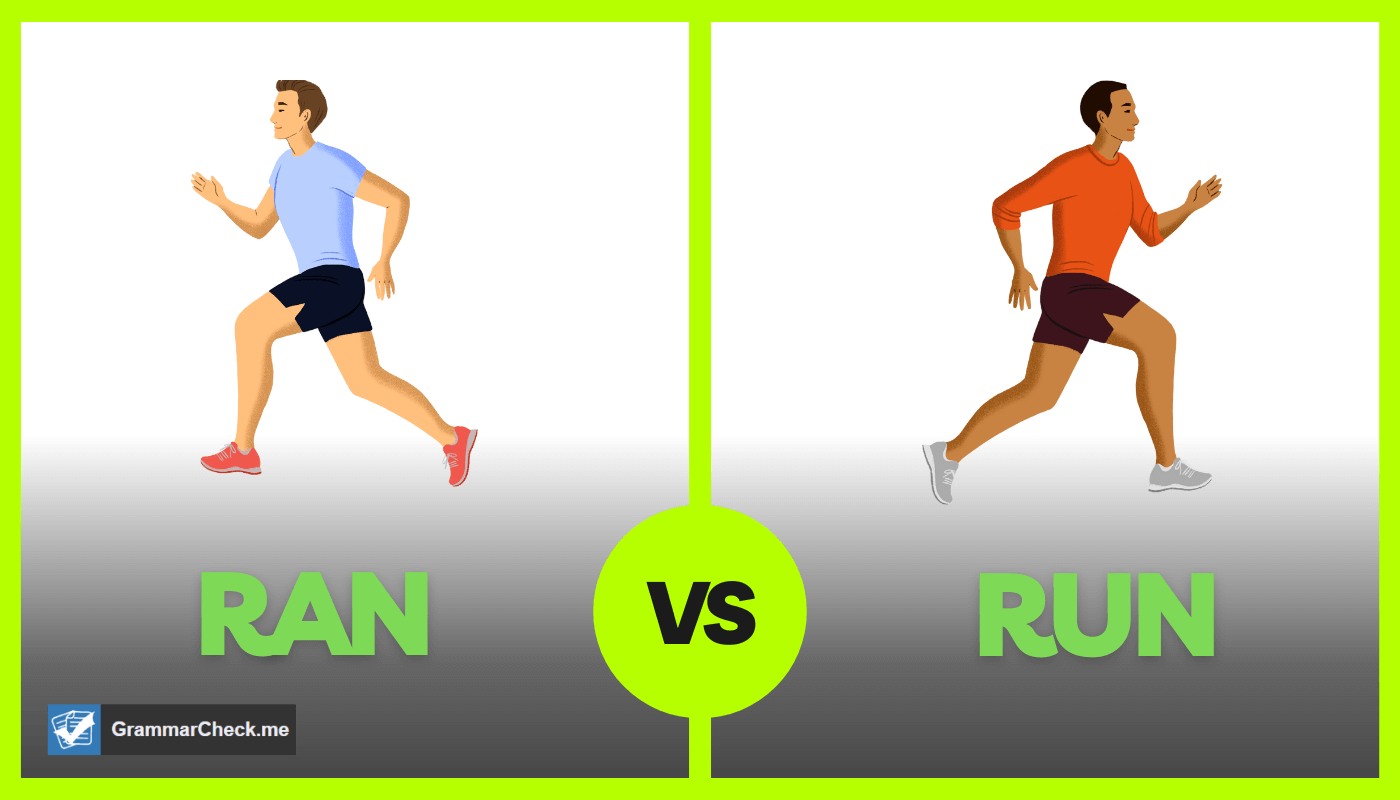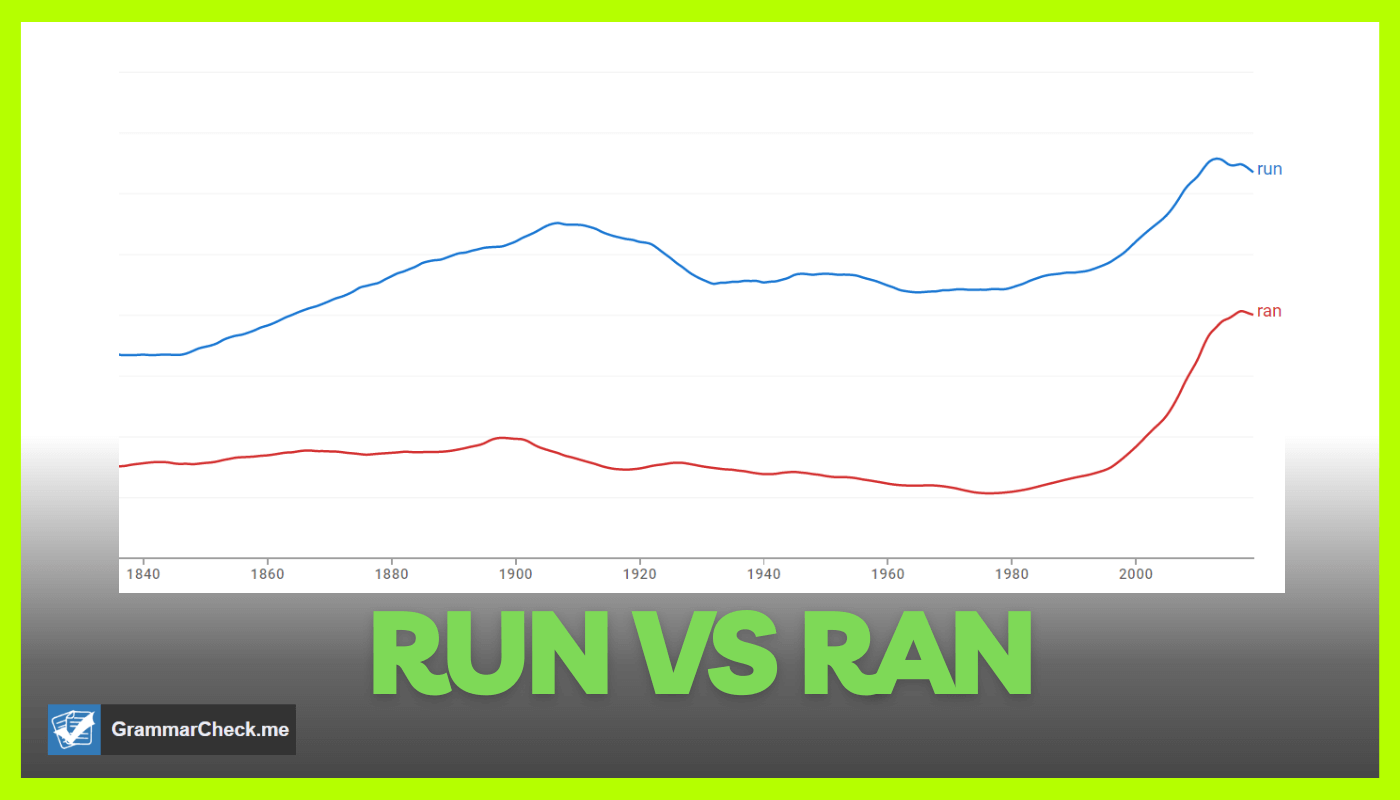The English language has many words which are spelled nearly identically but have totally different use cases. The words run & ran are a prime example. In fact, they are spelled just one letter apart. If you didn’t already know, these two words are NOT the same and should be picked depending on the context of a conversation or sentence. In this post, we’ll make choosing between run or ran so that you don’t make a silly spelling mistake!
Always using the right words? Make sure:
Check Your TextWhich Is Correct: Ran vs Run?

“Run” and “ran” are two words that are often confused by new writers. Just like the words, axle and axel, they are spelled just one letter a part! However, these two action verbs are NOT the same.
- Run – The present tense of the verb to “run”. This spelling should be used to refer to something happening right now or in the near future,
- Ran – The past tense form of the verb “run”. This word is used to refer to an event (running) that has already taken place.
Consider these examples to illustrate the difference between these two words.
- “Mark ran a race yesterday.” This example implies that Mark went for a run in the past (yesterday).
- “I run races.” This sentence indicates that the subject of the sentence still takes part in running races today.
Takeaway: Ran is past tense; run is present tense.
When To Use Ran
The word ran is the past tense version of the word run. Here are a few examples of how to use it in your writing.
- Scott ran to school yesterday.
- Obama ran the country for 8 years.
- I ran last week so my legs are sore today.
For further understanding, let’s break down the different conjugations of the past tense verb, ran. Just like the verbs re-use vs reuse, the spelling changes depending on the context of a sentence.
- Past Indefinite Tense
- I ran to the mall yesterday.
- You ran to the mall yesterday.
- Past Continuous Tense
- I was running from Steve yesterday.
- You were running from Steve yesterday.
- Past Perfect Tense
- I had run for office 6 times in the past.
- You had run for office 6 times in the past.
- Past Perfect Continuous Tense
- I had been running for 2 hours before I got cell reception.
- You had been running for 2 hours before I got cell reception.
Our post on has vs have also demonstrated how to use the different tenses in your writing.
When To Use Run
The word run is a present tense verb. Here are a few examples of how you can use this word in your writing.
- I love to run afterschool.
- Mark will be back in 15 minutes, he went for a run.
- I have to run errands today before I can relax.
To provide even more detail, consider these potential present tense conjugations of the verb “run”. Just like the verbs pedaling or pedalling, the spelling changes depending on the context.
- Present Indefinite Tense
- I run to school everyday.
- You run to school everyday.
- Present Perfect Tense
- I have run errands all day.
- You have run errands all day.
- Present Continuous Tense
- I am running for President of the United States.
- You are running for President of the United States.
- Present Perfect Continuous Tense
- I have been running for 5 miles!
- You have been running for 5 miles!
Just like we saw in our analysis of lose vs loose weight, spelling & grammar changes can totally change the meaning of a phrase!
Popularity Comparison

By taking a look at Google’s ngram data, we can see that “run” the more popular word. However, both words have become more popular since the early 1980’s.
Just like we saw with our comparison of the words he and I vs him and I, words often become less popular over time. As culture changes, so do the vocabulary used by authors, scholars, and common people.
Run vs Ran Pronunciation
Just like with the words yup or yep, there are many English words that are spelled similarly but have different pronunciations. Run and ran are prime examples of this same issue.
Watch the video above to get a firm understanding of how to pronounce these two words. There is a slight difference that you will notice!
Understanding Future vs Past Tense
To truly understand the difference between ran and run, you need to understand the difference between future tense and past tense of verbs.
- Past Tense – Represents actions that happened or occurred earlier; past tense verbs typically end in -ed and describe past events.
- Future Tense – Used to describe something that is expected or planned to happen in the future; these verbs most often include auxiliaries such as will and will be.
Frequently Asked Questions
Both ran and run are verbs. Run is in the present tense. For example, “I am currently on a run, can I call you back?” Ran is the past perfect tense. For example, “Mark ran last Wednesday.” The past participle in the situation is run.
Ran is the past tense form of run. Run is the present tense verb.
Yes, “ran” is a correct word. It’s the past tense of the verb “to run”. For example, “Tom ran to the store this morning to get some milk.”
Both can be correct depending on the context of the sentence. For example, you might say “Mark ran a business 5 years ago.” This is the past perfect tense. But you could also say “I currently run a business.”
The Bottom Line
Now you have a great understanding of the difference between ran vs run. This is one of many tricky spelling rules in the English language. Use ran if you want to talk about something that happened in the past tense. If you want to talk about something in the present tense, use run. And if you need some extra spelling help, use our grammar check online FREE tool. It will review your writing and identify any issues in seconds.
